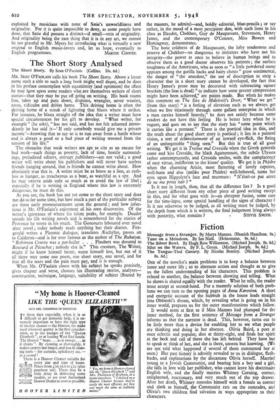The Short Story Analysed
The Short Story. By Sean O'Faolain. (Collins. 10s. 6d.)
MR. SEAN O'FAOLAIN calls his book The Short Story. Above a lesser name such a title to such a long book might well daunt, and he does in his preface contemplate with equanimity (and optimism) the effect he may have upon some readers who are themselves writers of short stories—that they may be put off going on writing. His book roams free, takes up and puts down, disputes, wrangles, never wearies, raves, ridicules and drives home. This driving home is often the driving home of a streak of lightning that blasts where it strikes. For instance, he blasts straight off the idea that a writer must have special circumstances for his gift to develop. " What writer, for example" (he asks), "has not said, and, has not felt ashamed imme- diately he has said it—' If only somebody would give me a private income '—knowing that to say so is to run away from a battle whose end is always a good or a bad piece of writing wrested from the tension of his life."
The obstacles that weak writers are apt to cite as an excuse for bad work—such things as poverty, lack of time, hostile surround- ings, prejudiced editors, corrupt publishers—are not valid ; a good writer will write about his publishers and will never -have useless friends hanging around, that is friends he cannot write about. Haw absolutely true this is. A writer must be as brave as a lion, as ruth- less as hunger, as treacherous as a bear, as watchful as a spy. And he may swerve aside only so ranch as to avoid the law of libel ; especially if he is writing in England where this law is extremely dangerous, he must do this.
As you see, the book has not yet come to the short story and does not do so for some time, but how much a part of the particular subject are these early pronouncements upon the general ; and how infec- tious is Mr. O'Faolain's enjoyment of-his own discoveries. Of the writer's ignorance of where his talent peaks, for example. Daudet spends his life writing novels and is remembered for the stories of Provence he wrote in his youth. The Goncourts laboured over novel after novel ; today nobody reads anything but their diaries. Fitz- gerald' writes a Platonic dialogue, translates 1Eschylus, passes on to Calderon—and is for ever famous as the author of The Rubaiyat. " Robinson Crusoe was a pot-boiler . . : Flaubert was devoted to Bouvard et Pecuchet ; nobody else is." This creature, The Writer, might if he knew himself better, waste himself less, but out of it all there may come one poem, one short story, one novel, and for that all the tears and the pain must pay,-and it is enough. When Mr. O'Faolain closes with his subject he speaks precisely, gives chapter and verse, chooses his illustrating stories, analyses— construction, technique, language, suitability of subject (flouted by
the masters, he admits)--and,, boldly editorial, blue-pencils ; or say rather, in the mood of a most percipient don, with such lions in his
class as Daudet, Chekhov, Guy de Maupassant, Stevenson, Henry James, and the contemporary O'Connor, Miss Bowen and Hemingway, demonstrates.- The bone coldness of de Maupassant, the lofty tenderness and reserve of Chekhov—so dangerous to imitators who have not his integrity—the power at once to believe in human beings and to observe them as a good doctor observes his patients ; the surface toughness of the Americans, who as soon as " a little poWdered snout appears among the gorilla backs and hairy chests " grow sentimental, the danger of " the anecdote," the use of description to strip a character that in a short story cannot be developed,- the fact that Henry James's prose may be decorated with subtracting square brackets (the lion is dead) " to indicate how some greater-compression might have been achieved," are pOinti made. But when he makes this comment on The Sire de Matitroit's Door, " What- we get " (from this story) " is a feeling of elevation such as we always get when we live" vicariously through some gallant enterprise in which a man carries himself 'bravely," he does not satisfy because some readers do not have this feeling He is better he when he is vaguer; and -goes' on to say that the -story ha's "some point which it carries like a pennant." There is the poetical idea in this, and the truth about the good short story is poetical ; it lies in a pointed vision, a sort of iclaircissement- of an inward eye-fick, the fixing of an unforgettable " thing seen." But. this is true of: all good writing. We get it in Troilus and.Cressida when the Greek generals come and 'kiss Cressida; the black Againemmin the subtle Ulysses rather contemptuously, and Cresida the . complacency of easy virtue, indifferent to the kisses' quality. We 'get it in Phedre when the charming Aricie, most flattering of lovely captives, well-born and also (unlike poor Phedre) well-behaved, turns her eyes upon Hippolyte's face and Murmurs: aN'etait-ce pas assez de ne me point hair?* Is it not in length, then, that all the difference lies ? Is a good short story different from any other piece of good writing except in this, and for what goes with it—an abrupter fusion, some care for the time-lapse, some special handling of the signs of character ? Is it not otherwise to be judged, as all writing must be judged, by the depth from which it is written, the final judgement lying always










































 Previous page
Previous page